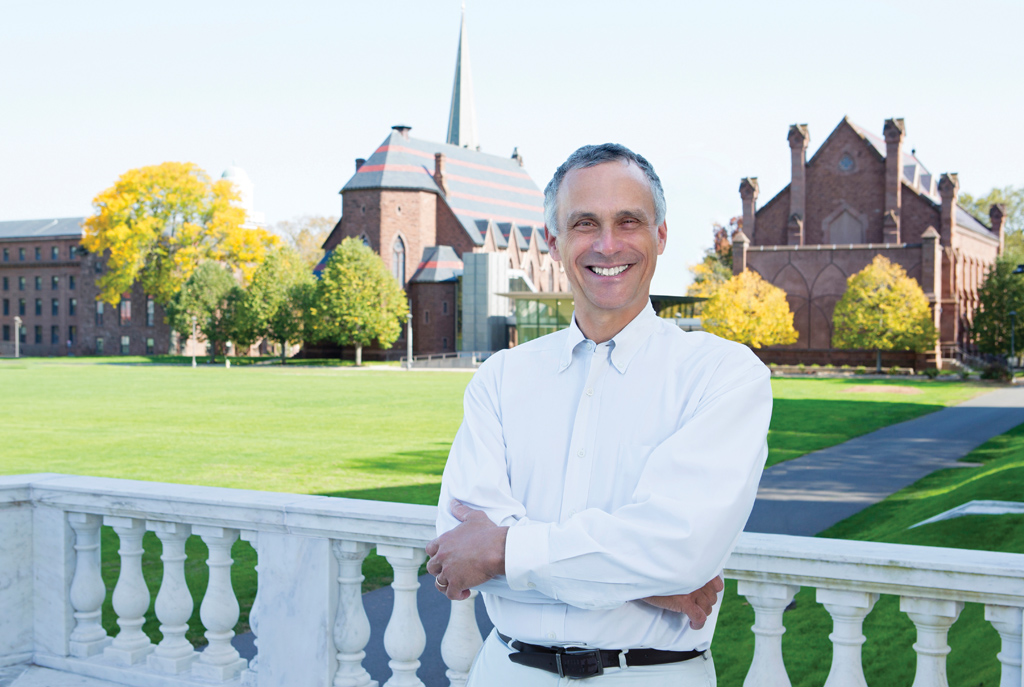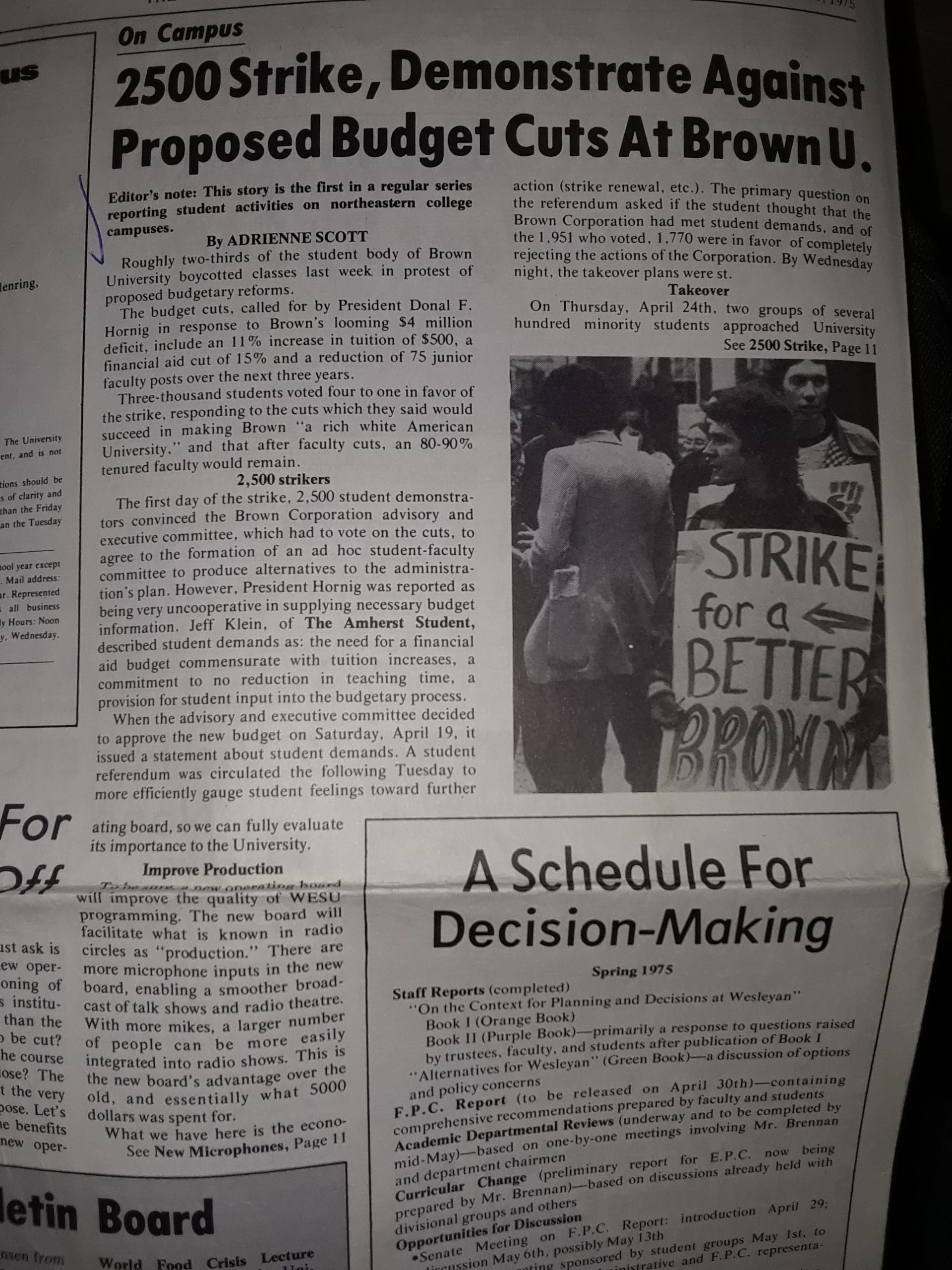President’s Letter: Effective Leaders Learn from Crises

Now that I’ve been a president for about 20 years, I’m frequently asked what it’s like to be in charge of a very decentralized, very exuberant organization like our university. Sometimes I joke, “the place runs itself!” More often, I point out how many groups feel their own position in the school gives them a privileged perspective on decision making. Sometimes to such a degree that they suggest they might do a better job running things themselves.
There is some truth to the idea. Students, faculty, trustees, alumni—each group is a vital stakeholder, and staff are also making key decisions on a day-to-day basis that keep Wesleyan running effectively. Presidents do have some power in all this, but most often they’re better served finding ways to persuade others to join them in moving the institution in a particular direction. Usually, without persuasion you only get inertia.
At Wesleyan, we have talented, energetic students, dedicated, creative faculty, and a powerfully resourceful staff. Since I first arrived in 2007, I’ve been fortunate to work with an extremely talented group of Cabinet members (some of whom are profiled in this issue). As a group, the Cabinet has no particular authority except to advise the president. But each officer has a crucial sector of the university for which they are responsible. When I began my tenure, most members of the leadership team had been here for quite some time, and I was among the younger people in the group. After retirements and departures, I am now the senior person not only in terms of rank, but also in terms of age and longevity. I have always learned from my colleagues, and now, with this generational shift, I can really benefit from paying attention to their new modes of collaboration and different styles of interaction. The variety of perspectives makes for better decision making, I trust, and it also makes for creative sparks that ignite positive change for our university.
In a crisis, the sparks get more intense and the decisions weightier. Over the last year, we have fostered an atmosphere of focused collaboration, and when it’s time for me to make a decision, I am confident I’m getting the best advice. Of course, thoughtful people often disagree, and my role is not always to create consensus; in challenging times, I try to make decisions and explain the trade-offs in as transparent a way as possible. I try to learn from my mistakes and our successes. As we begin 2021, the pandemic is still at the forefront of concern, but I already see three areas in which the lessons we’ve learned over these last several months can help make a positive difference at the university:
Inequality. Many people have noted how remote education has made inequality among students more visible. Teaching on Zoom revealed more about student living conditions than many students wanted exposed. And while we didn’t discover the digital divide during the pandemic, its effects on learning and mental health were made more obvious. We tried to be proactive in getting students the tools and support they needed, something not all educational institutions had the resources to do.
The reckoning with race that has coincided with the pandemic has awoken more instructors and administrators to the centrality of our anti-racist efforts. The pandemic experience has only reinforced the obligation of educational institutions to support their most vulnerable students, paying close attention to the intersections of racism and inequality. Just as frontline health workers and residents of nursing homes have been prioritized for vaccine distribution, higher education institutions should direct financial aid efforts to the students whose economic conditions leave them most at risk.
Connection. While educators are understandably rather suspicious of technology, its power to make connections to students and other colleagues is clear. Notwithstanding all the complaints about Zoom fatigue, attendance at faculty meetings and committee workshops was significantly better than it was when everyone was on campus. And from crisis communications to routine governance matters, engagement with colleagues in virtual meetings seemed to allow for new voices to be heard. People reluctant to speak up in a crowded room were more comfortable using the “raise your hand” function.
As for teaching, many professors who were skeptical about being able to really connect to students online discovered that virtual courses allowed them and many of their students to bring their whole selves to class in new ways. The pandemic experience has shown us the power of virtual connections to enhance learning, governance, and community building.
Compassion. The final lesson that I hope we take away from our pandemic experience in 2020 is that compassion can be greater than outrage. Now, we certainly had plenty of occasions to feel offended and to express fury over the past year. It is clear that, for many people, feeling outrage is a pleasure and a bonding experience.
But we have also witnessed the work that compassion does as we celebrated doctors, nurses, supermarket employees, and countless friends and neighbors who went beyond the call of self-interest and duty to help their communities become more resilient—or just stay alive. We can shake our heads reproachfully at those who congregated at bars, or who attacked others for wearing masks in public places. But we should also allow ourselves to be inspired by those who sewed masks for hundreds of other people or who found safe ways to bring food, affection, and community to the hungry and lonely.
Effective leaders learn from crises, and communities can become stronger by tackling them with compassionate solidarity. At Wesleyan, we have an opportunity to build a better future. Let’s seize that opportunity together.
Photo by Robert Adam Mayer

